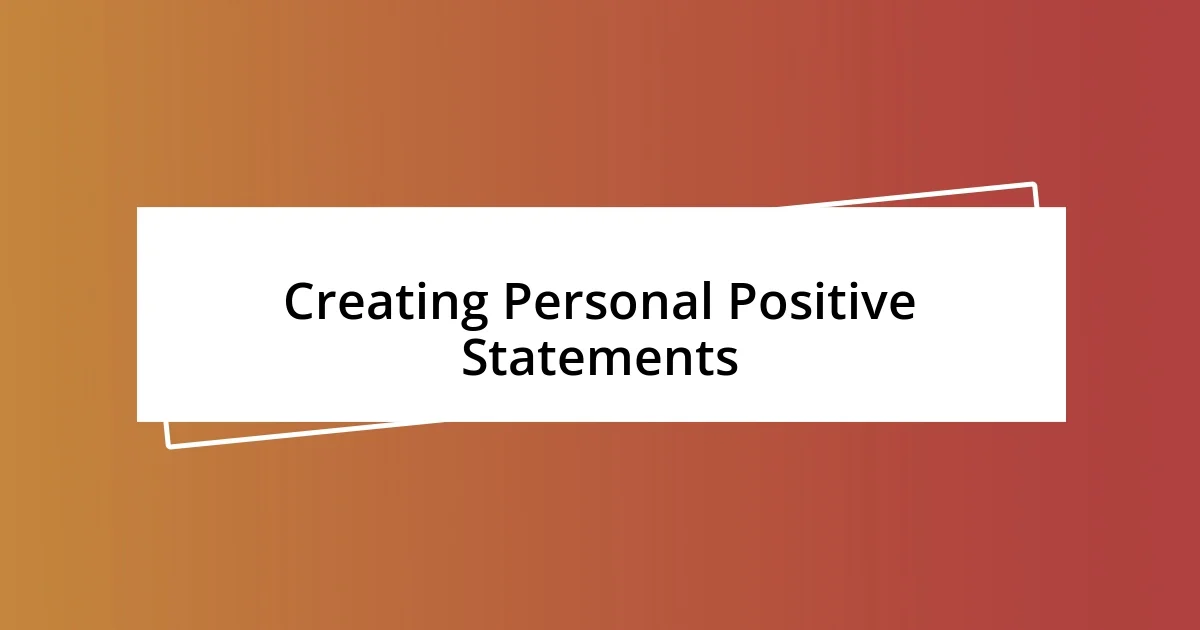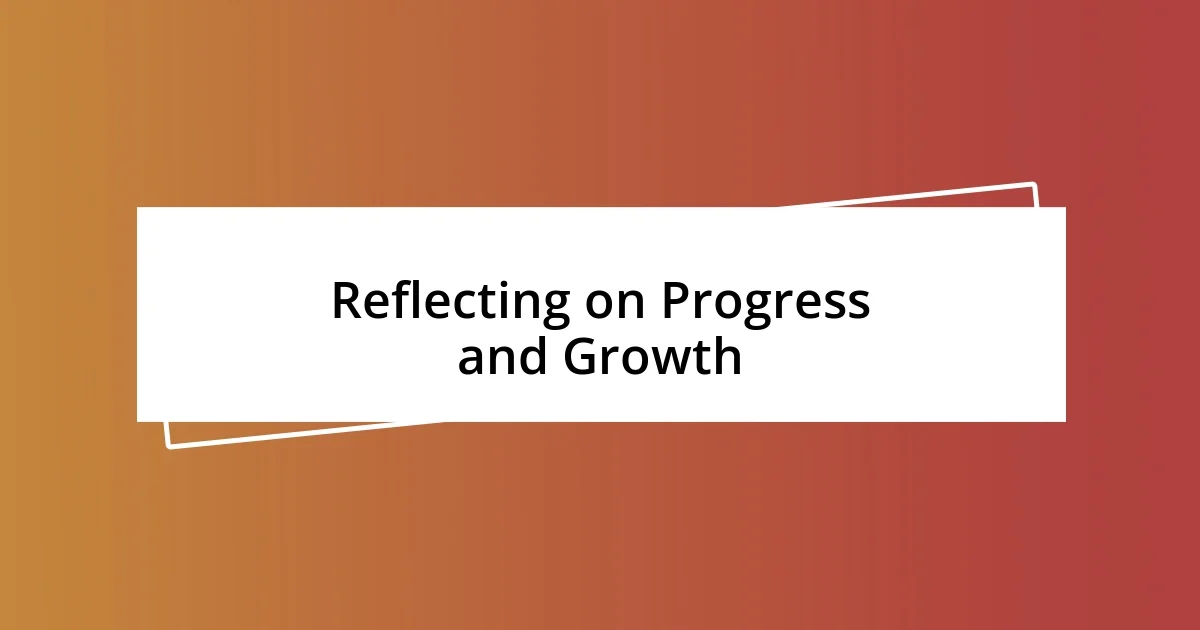Key takeaways:
- Positive self-talk can reshape self-beliefs and enhance confidence, resilience, and performance in challenging situations.
- Identifying and reframing negative thought patterns is crucial for transforming self-talk, promoting a more balanced and positive mindset.
- Consistency in practicing positive self-talk through personalized affirmations, visualization, and gratitude can lead to significant personal growth and improved self-worth.

Understanding Positive Self-Talk
Positive self-talk is essentially the practice of consciously directing your inner dialogue to be more encouraging and uplifting. I remember a period in my life when self-doubt crept in during challenging moments. Instead of succumbing to that negative voice, I started flipping the script, asking myself, “What would I say to a friend in this situation?” It’s remarkable how that simple adjustment shifted my mindset.
One of the most powerful aspects of positive self-talk is its ability to reshape our beliefs about ourselves. For instance, when I faced a significant career challenge, I began telling myself, “I am capable of overcoming this.” Over time, my initial skepticism turned into a belief that fueled my actions, encouraging me to embrace opportunities rather than shy away from them.
Understanding that self-talk isn’t just empty words can be transformational. Have you ever noticed how quickly negative thoughts can spiral out of control? I certainly have. Recognizing this, I started catching those detrimental thoughts and replacing them with affirmations that resonate deeply within me. It’s a journey that requires practice, but the rewards—confidence and resilience—are well worth the effort.

Benefits of Positive Self-Talk
The benefits of positive self-talk are profound and far-reaching. I remember a time when I was preparing for an important presentation, and my nerves began to set in. Instead of focusing on what could go wrong, I chose to remind myself, “I have prepared for this, and I can handle it.” That simple shift not only calmed my nerves but also enhanced my performance, proving that the way we talk to ourselves can significantly influence our outcomes.
Here are some benefits I’ve noticed from practicing positive self-talk:
- Enhanced Confidence: Just like when I reassured myself before that presentation, positive affirmations can boost your self-esteem in high-pressure situations.
- Stress Reduction: By calming my inner critic, I found a considerable decrease in anxiety during pivotal moments.
- Improved Resilience: Facing setbacks became more manageable for me as I learned to reframe challenges as learning opportunities.
- Better Relationships: When I cultivate kindness in my self-talk, I often extend that positivity to others, enriching my connections.
- Increased Motivation: Telling myself, “I can do this,” provides a powerful push to take action, even when I feel hesitant.

Identifying Negative Thought Patterns
Recognizing negative thought patterns is a crucial step in transforming our self-talk. I often found myself gravitating towards thoughts like, “I always mess things up,” which can become a self-fulfilling prophecy. It’s essential to catch these patterns in action; the moment you notice a critical voice creeping in, pause and question its validity. Are these thoughts true, or am I merely allowing my fears to dictate my narrative?
Another common pattern is the tendency to catastrophize. I’ve experienced moments where I blew things out of proportion—like when I submitted a big project and immediately started worrying about every possible mistake. Identifying these overreactions helped me replace them with rational thoughts, such as, “I did my best, and I can learn from any feedback.” Shifting gears from negativity allows for a more balanced perspective and less anxiety around outcomes.
Paying attention to language is equally important. Words like “never” and “always” can inadvertently reinforce negative beliefs. I used to think, “I never succeed at anything,” which set a discouraging tone for my actions. By recognizing this black-and-white thinking, I learned to insert nuances, replacing “never” with “sometimes” or “occasionally.” This subtle change has not only uplifted my mindset but also opened new avenues for growth and opportunity.
| Negative Thought Patterns | Replacements |
|---|---|
| “I always mess things up” | “I am learning and growing from my experiences” |
| “I’ll fail if I try” | “It’s okay to make mistakes; they’re part of the journey” |
| “I never succeed” | “Sometimes I succeed, and that’s worth celebrating” |

Techniques for Effective Self-Talk
When it comes to effective self-talk, I’ve found that crafting personalized affirmations works wonders. Instead of generic phrases, I focus on what resonates with me. For instance, rather than saying “I am good enough,” I tell myself, “I bring unique value to every situation.” This tiny tweak not only feels more authentic but also reinforces my self-worth on a much deeper level. Have you ever noticed how the tone of our inner voice changes when we infuse it with personal meaning?
Another technique that has significantly improved my self-talk is visualization. When I face challenges, I take a few moments to picture myself succeeding in that scenario. I remember thinking about an upcoming meeting and envisioning myself presenting confidently, receiving nods of agreement from my colleagues. This mental rehearsal not only prepares me for success but also instills a sense of calm; it’s like a mental dress rehearsal for life.
Finally, keeping a gratitude journal has been transformative for my self-talk as well. Every evening, I jot down three things I’m thankful for, no matter how small. Reflecting on the positive aspects of my day shifts my mindset from what’s wrong to what’s right. I’ve realized it’s challenging to be harsh on myself when I’m focusing on gratitude. What simple practices have you incorporated into your routine to reinforce positivity in your self-talk?

Creating Personal Positive Statements
Creating personal positive statements is an art that allows us to reclaim our inner dialogue. I remember when I first started crafting my own affirmations; it felt a bit awkward at first. Slowly, I began to see the impact. Instead of saying, “I can handle this,” I switched to, “I thrive in challenging situations.” That shift not only empowered me but also made my self-talk feel truly mine. Have you ever considered how your words can shape your experience?
What I’ve learned is that the most effective positive statements come from a place of authenticity. They should reflect your values and aspirations. I once struggled with making time for self-care. By telling myself, “I deserve to prioritize my well-being,” I inadvertently altered my behavior. It was fascinating to see how reinforcing a simple belief could lead me to set aside time for activities I love. This connection between belief and action is powerful, don’t you think?
Putting these statements into a visible format can also create a daily reminder of your worth. I’ve started writing my favorite affirmations on sticky notes and placing them around my workspace. Each time I glance at them, I feel a rush of motivation. It reminds me that I’m capable, resilient, and continually evolving. Isn’t it amazing how simple prompts can redirect our thoughts and lift our spirits throughout the day?

Maintaining Consistency in Practice
Maintaining consistency in practice has been essential in enhancing my positive self-talk. Initially, I struggled with regularity, often forgetting to check in with myself throughout the day. However, I established a simple routine of morning affirmations paired with my coffee ritual. This wasn’t just about starting my day on a positive note; it became a moment of self-reflection and intention that anchored my mindset. Are there small habits you could integrate into your daily routine to foster this consistency?
I find that creating reminders helps keep the practice alive. For instance, I set notifications on my phone with affirmations tailored to the challenges I might face that day. The first time I did this, I felt a wave of support wash over me right when I needed it most. It’s intriguing how these little nudges can shift your mindset, isn’t it? What methods do you use to remind yourself of your worth in the busy flow of life?
Also, I discovered that pairing self-talk with physical activities, like jogging or yoga, solidifies the positive messages in my mind. When I run, I often repeat affirmations aloud. The act itself feels empowering; it’s as if each stride is echoing my worth and resilience. I’ve noticed that engaging both my body and my mind in this way creates a vibrant cycle of positivity. Have you ever connected your self-talk with physical movement to enhance its impact?

Reflecting on Progress and Growth
Reflecting on my progress and growth through positive self-talk reveals just how transformative this journey has been. I often find myself looking back at the person I was a year ago, grappling with doubt and negativity. Now, it’s like a light bulb has gone off in my mind—by affirming my strengths, I’ve gradually cultivated a deeper belief in my capabilities. Have you ever traced the threads of your journey and recognized how far you’ve come?
One of the most eye-opening moments for me was realizing how quickly I began to internalize the affirmations I repeated daily. There was a time when I would stare at the mirror and recite, “I am worthy of good things.” At first, it felt mechanical, but after some repetition, those words began to resonate on a deeper level. This shift ignited a confidence that allowed me to pursue opportunities I once hesitated to consider. Have you had similar experiences where your words transformed your perception of self?
Sometimes, I take a moment to jot down the milestones I’ve achieved, no matter how small. One day, I wrote about overcoming the fear of public speaking, a significant hurdle for me. Reflecting on this journey, I realized that my inner dialogue played a crucial role in building that courage. The act of acknowledging my victories continues to breed motivation for future endeavors. How do you celebrate your own growth, and what role does self-talk play in that celebration?














